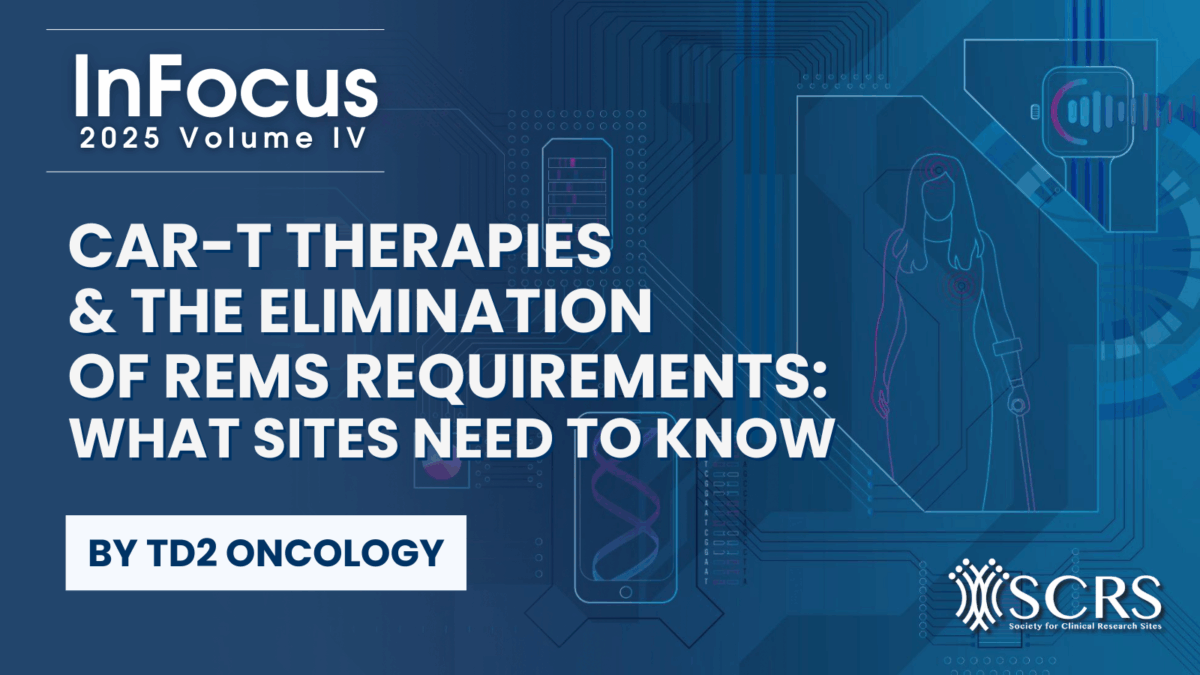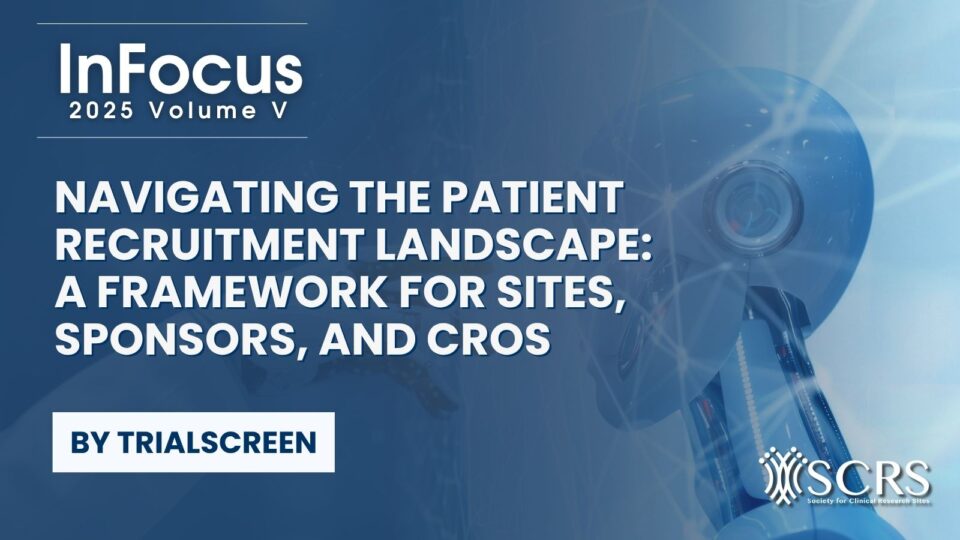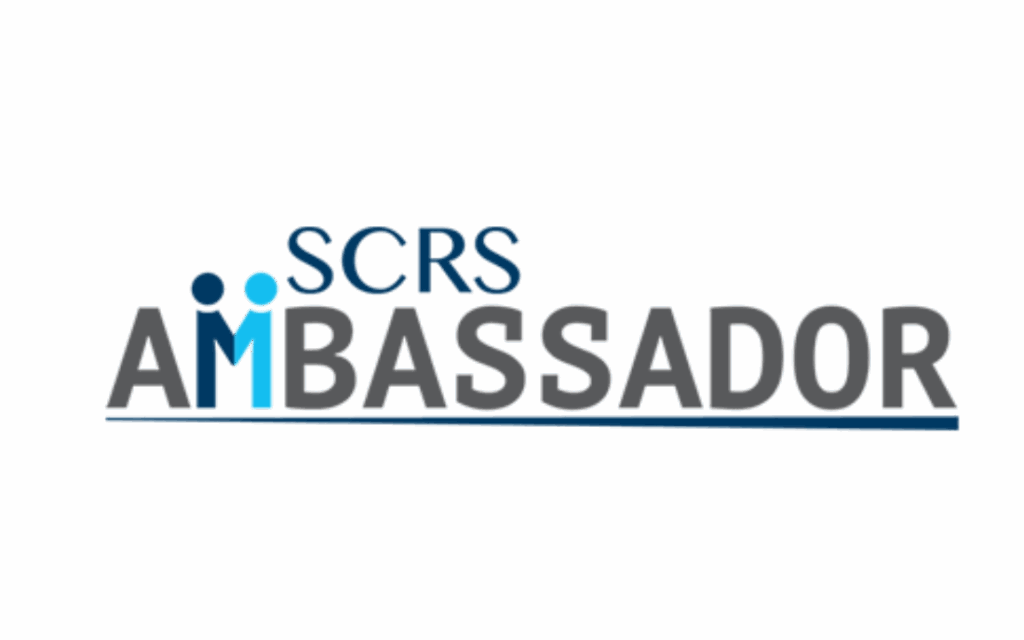CAR-T Therapies and the Elimination of REMS Requirements: What Clinical Research Sites Need to Know

In June 2025, the U.S. Food and Drug Administration (FDA) announced the removal of Risk Evaluation and Mitigation Strategy (REMS) requirements for all approved BCMA- and CD19-directed autologous CAR-T cell therapies. This includes products such as Yescarta (axicabtagene ciloleucel), Kymriah (tisagenlecleucel), Breyanzi(lisocabtagene maraleucel), Tecartus (brexucabtagene autoleuce), Abecma (idecabtagene vicleucel), and Carvykti (ciltacabtagene autoleucel). The decision reflects the agency’s confidence in the safety infrastructure surrounding these therapies and aims to improve access and reduce burden for both patients and providers.
As Cell and Gene Therapies (CGT) have been at the forefront of emerging technologies over the last 15 years, companies have had to establish workable paths that enable their unique technologies to be safely implemented during the early investigational phases.
For clinical research sites, the change represents a major shift in where CAR-T studies can be conducted. For some sites, REMS programs have imposed operational and regulatory barriers limiting access to trial participation. With this decision, many of those barriers have been lifted, opening the door for more flexible and efficient site activation and trial execution across a much larger pool of medical treatment facilities.
Understanding the Rationale
REMS programs were initially implemented for CAR-T therapies due to the risk of serious, potentially life-threatening side effects such as cytokine release syndrome (CRS) and immune effector cell-associated neurotoxicity syndrome (ICANS). The programs required treatment centers to complete site certifications, ensure 24/7 emergency response capability, long-term safety monitoring for treated patients, and stock the IL-6 receptor blocker, tocilizumab, on-site, while the industry was establishing a clear understanding of tolerability and safety management
With industry support of long-term follow-up and medical community review, the safety standards have been modified in line with a clearer understanding of how these treatments impact patients. The FDA has now determined that these REMS requirements are no longer necessary to ensure the safe use of these therapies.
Over the past several years, providers have gained significant experience in managing CRS and ICANS. In addition, product labeling now includes detailed guidance on risk recognition and mitigation. The FDA has also retained long-term post-marketing safety surveillance requirements and continues to mandate adverse event reporting under 21 CFR 600.80.
Practical Impact for Clinical Research Sites
The removal of REMS affects not only the commercial use of CAR-T therapies but also their clinical investigation. Clinical research sites are likely to see several benefits, particularly in terms of reduced administrative burden and broader trial access.
Faster Site Activation
Under the prior REMS programs, sites had to complete specialized training, maintain certifications, and submit ongoing documentation to participate in CAR-T clinical trials. These steps were often time-consuming and resource-intensive, especially for community-based or non-academic sites. With REMS lifted, these requirements no longer apply, which can shorten the timeline from site selection to first patient enrolled.
Safety Management Strategies
Sites were previously required to store tocilizumab on-site and maintain around-the-clock access to emergency interventions. While these elements are no longer regulatory requirements, it remains good clinical practice to have immediate access to tocilizumab, as toxicities such as cytokine release syndrome can be sudden and require immediate treatment. This may enable smaller research centers or outpatient facilities to consider participation in CAR-T trials that were previously out of reach
Increased Patient Access
For patients, the elimination of REMS reduces logistical hurdles that may have previously impacted trial enrollment or participation. The required post-infusion proximity to the treatment center has been shortened from four weeks to two weeks, with daily monitoring only required during the first week. Driving restrictions have been reduced from eight weeks to two weeks. These changes make it easier for patients to access CAR-T studies without significant disruptions to their daily lives, especially for those traveling from outside the area.
Simplified Compliance and Monitoring
With REMS no longer in place, research sites no longer have to manage REMS-specific audits or documentation. However, safety remains a priority. Many sites are accredited by the Foundation for the Accreditation of Cellular Therapy (FACT) in order to deliver CAR-T therapies. Founded in 1995, FACT establishes standards for high quality medical and laboratory practice in cellular therapies. FACT accreditation is voluntary, although it is required by many cellular-therapy product manufacturers and insurance payers. The risks of CRS and ICANS are still prominently listed in each therapy’s boxed warning, and sponsors will continue to require detailed pharmacovigilance reporting. Sites should ensure that standard operating procedures are updated to reflect current monitoring timelines and that staff remain well-trained in managing CAR-T-associated risks.
Strategic Considerations
As cell and gene therapy development continues to grow, the elimination of REMS for CAR-T may represent a broader shift toward the normalization of complex biologic treatments. Clinical research sites that previously avoided CAR-T trials due to infrastructure constraints or regulatory hurdles may now want to revisit their strategy. In order to support sites, FACT has created a Community CAR-T Working Group comprised of community-based physicians current administering – or preparing to administer – CAR-T therapies.
Participating in CAR-T trials can position a site at the forefront of oncology research and provide access to cutting-edge treatments for patients who have exhausted standard options. Removing the extra requirements of REMS may also help sponsors expand trial networks and improve geographic diversity in study populations. signals a step toward making these therapies more accessible, both in clinical trials and standard care settings.
For research sites, this presents a timely opportunity to reassess participation in CAR-T and other advanced therapy studies. Whether a site is already involved in cell therapy trials or is evaluating its readiness to expand into this area, the regulatory landscape is becoming more favorable.
With proper training, thoughtful planning, and close collaboration with sponsors and CRO partners, more clinical research sites can now take part in the next wave of innovation in oncology. CAR-T therapies have already demonstrated their potential to transform patient outcomes. Removing unnecessary barriers will allow more patients, providers, and sites to play a role in advancing the field.
About TD2 Oncology
TD2 Oncology is a full-service oncology-focused contract research organization that supports the development of advanced cancer therapies, including CAR-T, cell and gene therapies, antibody-drug conjugates, and radiopharmaceuticals. We provide specialized clinical trial design, operational expertise, and regulatory guidance to sponsors and sites conducting complex oncology trials.
To learn more about how TD2 supports clinical research sites involved in innovative cancer therapies, visit www.td2inc.com.
Contributors
Alan Miller, MD, PhD – Chief Medical Officer at TD2 Oncology
Connect with Dr. Miller on LinkedIn
Susan Night, JD, LLM – Senior Vice President, Strategy and Growth at TD2 Oncology
Connect with Susan on LinkedIn
Suzanne Vogt – Clinical Project Director at TD2 Oncology
Connect with Suzanne on LinkedIn
Tessa Gonzalez – Commercial Marketing Manager at TD2 Oncology
Connect with Tessa on LinkedIn




